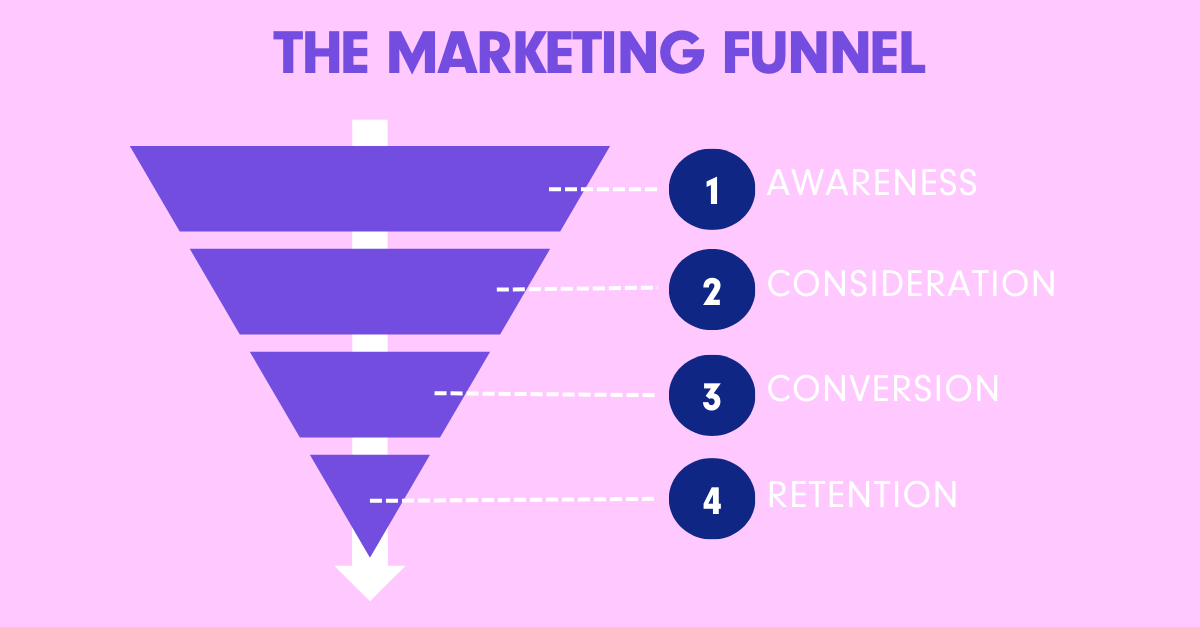How to get the most from your agency relationship

When people think about working with a marketing agency, the first thing that comes to mind is resu…

The marketing funnel. Where do we start? Over the years, the funnel has been reinterpreted and reimagined. Some argue it’s outdated, others see it as more of a fluid circle. Regardless of where you stand, it’s easy to get overwhelmed by the complexity of it all. That’s why I’m stripping it back to the basics and focusing on the core principles: Awareness, Consideration, Conversion, and Retention.
Picture a funnel; it starts wide at the top and narrows as you move down. Each stage plays a distinct role in guiding potential customers towards buying your product or service.
At the top, it’s like meeting someone new. As you move further down, it’s about building a connection, answering questions, and eventually offering something that solves a need or problem.
Throughout this blog post, I’ll use analogies like these to help simplify the key concepts behind the funnel. This will hopefully make these concepts more relatable and actionable, so you can confidently apply these principles to your business - whether you’re selling a product, offering a service, or building long-term relationships with your audience.

The top of the funnel is all about getting noticed. It’s where you introduce your brand to as many people as possible who could be interested in your product or service.
At this stage, potential customers are weighing their options. Your goal is to convince them that you’re the best choice by addressing their needs and answering their questions.
Robert Caldini’s book, Influence, details how social proof and authority can help build credibility at this stage. Examples of social proof include reviews and case studies, awards, and expert endorsements.
This stage is all about turning interest into action, whether that’s making a purchase, signing up for a service, booking an appointment, or taking any other meaningful step toward becoming a customer. There is a good chance that you’ve obtained some form of contact at this stage - they may have signed up to your email database, for example.
Your focus here is to make it as easy and compelling as possible for people to take that next step.
Customers might still be sitting on the fence here, so this is a good time to potentially consider introducing offers they can’t refuse.
The journey doesn’t end when someone becomes a client or customer. Retention is about maintaining relationships, delivering ongoing value, and encouraging repeat business or ongoing engagement.
Not everyone will convert right away, and that’s normal. It’s important to consistently test, measure, and refine your strategy at every stage. Optimise what works and drop what doesn’t.
Before you drive traffic, ensure your website and content are ready. It can be a waste of advertising spend if you’re driving traffic to a website full of errors or irrelevant content.
It’s like hosting a party at your new house: you wouldn’t invite your friends over before tidying up and buying the right drinks or snacks. Similarly, a good website is essential for converting interest into action. It also promotes you 24/7, even when you’re asleep.
Understanding the marketing funnel doesn’t need to be daunting. Think of it as a roadmap guiding your customers’ journey, from saying hello to building a long-term relationship.
Take the time to consider your marketing activities—identify how they target your audience and where they fit within the funnel. Are you addressing each stage effectively? Expand on your existing efforts to ensure you are guiding your audience seamlessly from awareness to decision-making.
Remember that each stage of the funnel requires tailored content. For instance, individuals in the awareness stage need educational content to understand your product and its relevance to their lives. In contrast, those in the consideration stage may need more concrete evidence, such as reviews or testimonials, to reinforce their decision.
Finally, don’t forget to test and try new ideas regularly. By continuously adapting, you’ll stay ahead in a landscape that’s always changing.
We have a team of experts on hand at RKH to help you with your objectives, drop us a message if you’d like to discuss your business and your aims!
Talk to us